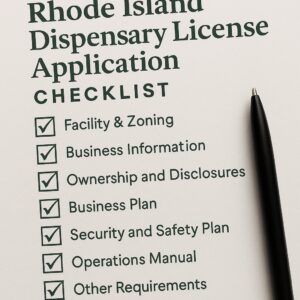Navigating the Maze: A Deep Dive into the Rhode Island Dispensary Application Checklist
 The journey to securing a retail cannabis license in Rhode Island is a marathon, not a sprint. With the state’s Cannabis Control Commission (CCC) expected to open a new application window for 24 retail licenses in 2025, the time for aspiring cannabis entrepreneurs to prepare is now. The state uses a hybrid lottery system, meaning only the most complete and well-prepared applications will even make it to the final selection phase.
The journey to securing a retail cannabis license in Rhode Island is a marathon, not a sprint. With the state’s Cannabis Control Commission (CCC) expected to open a new application window for 24 retail licenses in 2025, the time for aspiring cannabis entrepreneurs to prepare is now. The state uses a hybrid lottery system, meaning only the most complete and well-prepared applications will even make it to the final selection phase.
To succeed, you must meticulously address every requirement. This guide provides a detailed walkthrough of the official Cannabis Establishment Retail License Application Checklist. We will break down each section to give you a clear understanding of what regulators are looking for. We will also link to the official checklist document within this post for your reference – right here.
Facility and Zoning: Your Physical Foundation
Before you can sell a single product, you need a compliant physical location. This is often the first and most significant hurdle. The Rhode Island Dispensary Application Checklist visits this requirement first.
-
Property Identification: You must provide the specific address and plat/lot numbers for your proposed dispensary.
-
Municipal Approval: You need “final zoning approval” from the host city or town. Researching which municipalities have opted-in to allow cannabis retail is a critical first step.
-
Ordinance Compliance: The application requires a sworn statement (attestation) that you will comply with all local laws and ordinances.
-
Property Control: You must submit proof that you either own the property or have a lease agreement that explicitly permits the operation of a cannabis business.
-
Location Restrictions: You must provide definitive proof that your proposed site is not within 500 feet of any K-12 school.
-
Site and Floor Plan: A professional and detailed floor plan is mandatory. It must show all areas and activities, including security camera placements, secure storage areas, and how the facility complies with the Americans with Disabilities Act (ADA).
Business Information: Establishing Your Legitimacy
Regulators need to know exactly who they are licensing. This section is about formalizing your business entity. The Rhode Island Dispensary Application Checklist covers the aspects that they will require as follows:
-
Legal Identity: You must provide your legal business name and any DBAs (“doing business as” names), along with your Articles of Incorporation. You must be a registered business entity with the State of Rhode Island.
-
Authority to Operate: The application requires proof that your company is authorized to conduct business in Rhode Island.
-
Tax and Compliance: You will need to provide your Federal Employer Identification Number (FEIN), a taxpayer status attestation, and designate a specific person as your Compliance Officer.
Ownership and Disclosures: The Mandate for Transparency
The CCC demands absolute transparency about every individual and entity involved in your operation. There is no room for ambiguity.
-
Governing Documents: Your company’s operating agreement, bylaws, or other governance documents must be submitted.
-
List of Key Persons: You must provide a comprehensive list of all owners, officers, managers, and key interest holders as defined by state regulation.
-
Financial Disclosures: A complete disclosure of all financial interests in the company is required, along with a plan to divest from any prohibited financial interests.
-
Cannabis History: You must disclose any prior or existing cannabis licenses you or your team members have held, in any state, along with any associated violations.
-
Agreements: Any agreements related to the operation or ownership of the dispensary must also be disclosed.
Business Plan: Your Blueprint for Success
A thorough, professional business plan is non-negotiable. It proves to regulators that you have a viable, sustainable, and responsible business model.
-
Experience: Describe your team’s business experience, with a special focus on any direct cannabis industry experience.
-
Funding Sources: You must provide a detailed disclosure of where all your funding is coming from, including equity investments, debt, and operating capital.
-
Financial Plan: This includes a start-up budget and a long-term financial feasibility plan demonstrating you can remain operational.
-
Compliance and Oversight: Your plan must include a strategy for how you will maintain regulatory compliance and financial oversight.
-
Operational Timeline: Provide a detailed timeline outlining the steps you will take from license approval to your grand opening.
Security and Safety Plan: Protecting Assets and People
Cannabis retail is a high-risk industry. Your security plan must be robust and leave no question unanswered.
-
Facility Security Systems: Detail your alarm systems, surveillance cameras (number, placement, storage), and access control procedures.
-
Vendor Safety: Explain your procedures for safely and securely managing third-party vendors.
-
Cash Management: Provide a detailed plan for managing cash and other forms of payment securely.
-
Banking Plans: Given the federal challenges, you must have a secure banking plan with a legitimate financial institution.
Operations Manual: The Day-to-Day Playbook
This manual dictates how your dispensary will function. It should be a comprehensive guide for every aspect of your daily operations.
-
Data and Records: Detail your procedures for recordkeeping and ensuring the security of sensitive data.
-
Policies and Training: This includes policies for ID checks, sales procedures, employee training, and maintaining a drug-free workplace.
-
Inventory Control: You need policies for seed-to-sale inventory tracking, product labeling, packaging, marketing, and advertising.
-
Safety and Emergency Procedures: Include procedures for odor control, an emergency action plan, a community safety plan, and how you will handle product quarantines and recalls.
Other Requirements: Final Checklist Items
-
Geographic Zone: Rhode Island divides the state into geographic zones for licensing. You may only submit one application per geographic zone.
-
Application Fee: A fee of $7,500 is due upon application, though this can be waived for approved social equity applicants.
Frequently Asked Questions (FAQ)
What exactly is a social equity applicant in Rhode Island?
A social equity applicant is someone the state has identified as having been disproportionately impacted by the prohibition of cannabis. This often includes individuals with past cannabis convictions or those who have lived in heavily impacted areas. These applicants may receive fee waivers and other benefits in the licensing process.
When can I actually apply for a dispensary license?
The application window is currently closed. However, the Rhode Island Cannabis Control Commission is expected to announce a new round for 24 retail licenses sometime in 2025. Preparation should begin many months in advance.
The checklist seems overwhelming. Do I need professional help?
While not technically required, the immense detail and complexity of the Rhode Island application process make professional guidance highly advisable. The application is competitive, and a small mistake or omission can lead to disqualification.
How can a firm like Collateral Base assist with this process?
Collateral Base is a national consulting firm composed of cannabis business experts and attorneys who specialize in winning competitive state licenses. They work directly with applicants to develop every required document mentioned in the checklist—from the technical writing of the security and business plans to ensuring all financial and ownership disclosures are perfect. Using a firm like Collateral Base transforms an overwhelming process into a strategic project, significantly increasing your chances of submitting a compliant, merit-worthy, and ultimately winning application.





